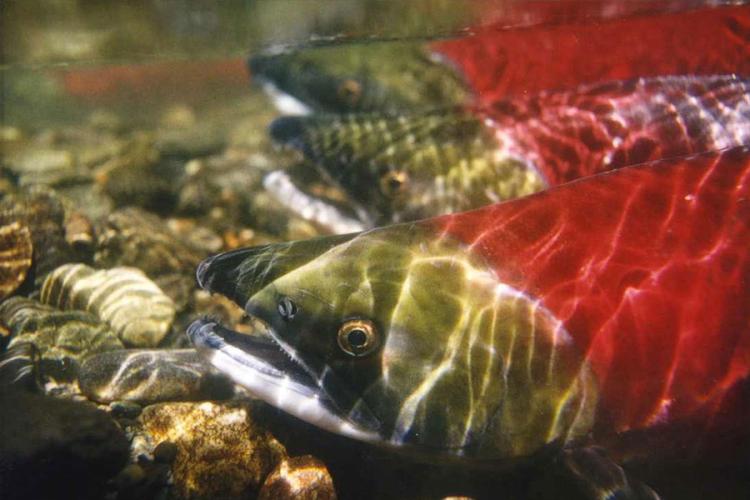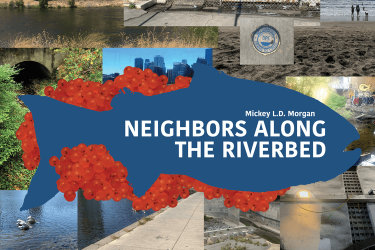Today, the Department of Commerce and NOAA announced plans for $27 million to recover threatened and endangered Pacific salmon in the face of climate change. These funds, part of President Biden’s Investing in America agenda, are made possible by the Inflation Reduction Act — the largest investment in climate action ever. This investment in science will support informed management actions as a component of NOAA’s comprehensive strategy for Pacific salmon recovery.
NOAA’s strategy outlines how investment in science enhances efforts in restoring and connecting Pacific salmon habitats, ensuring water quality and quantity, managing sustainable fisheries and continuing to improve fish hatcheries. This funding will help support the science component of the agency’s recovery strategy by expanding its expertise and improving access to resources necessary to advance its science capabilities. Today’s announcement builds on the Biden-Harris Administration’s significant progress and commitments to support salmon recovery, including a historic agreement to work in partnership with Pacific Northwest tribes and states to restore salmon populations in the Columbia River Basin, among other important goals.
“While climate change has severely hurt Pacific salmon populations, the Biden-Harris Administration is committed to salmon recovery along the West Coast,” said U.S. Secretary of Commerce Gina Raimondo. “This funding, made possible by President Biden’s Inflation Reduction Act, will help NOAA make more informed decisions to aid Pacific salmon survival and recovery efforts and move Pacific salmon populations closer to healthy and abundant levels that benefit our West Coast ecosystems, communities and economies.”
Robust science is critical to adaptively managing the diversity of Pacific salmon populations, addressing uncertainties in a changing climate and investing in the most effective solutions in watersheds along the West Coast. Supporting Pacific salmon recovery is particularly beneficial to cultural heritage and livelihoods of Pacific Northwest tribes. Indigenous Knowledge of Pacific salmon is vital to the conservation and restoration of the species.
The $27 million in funding will be distributed through 2026 to NOAA’s Northwest and Southwest Fisheries Science Centers to conduct science and research to advance salmon recovery. Specific activities include:
- Integrated model development and application: Improving salmon life-cycle computer models and including ecosystem parameters to inform management strategies that rely on predictions of Pacific salmon abundance.
- Restoration, recovery and reintroduction techniques: Assessing habitat restoration effectiveness, improving methods to determine meaningful conservation and management decisions and measuring the ability of reintroduced salmon to adapt to future environmental conditions.
- Habitat stressors in freshwater and estuary environments: Investigating the impacts of stormwater pollutants on salmon to include using toxicity data in management decisions.
- Ocean and nearshore ecology: Measuring indicators of ocean productivity and predation rates to improve predictions of salmon survival and growth.
“This Inflation Reduction Act funding provides an opportunity to advance impactful salmon science and research at our West Coast fisheries science centers,” said Janet Coit, assistant administrator for NOAA Fisheries. “Each salmon species has a robust recovery plan developed through years of work and collaboration with communities and co-managers and includes the best available science to identify the actions needed to recover the species.”
“NOAA scientists at Seattle's Northwest Fisheries Science Center need funding for groundbreaking research into how salmon are adapting to the changing climate and dealing with threats like stormwater pollution here in Washington,” said Washington Senator Maria Cantwell. “Salmon are central to the culture, economy and marine ecosystems of the Pacific Northwest, and this investment in science will help us make the right choices and help protect salmon for years to come."
"From the California Coast through upstream rivers, Chinook and coho salmon populations have plummeted, leading to catastrophic consequences for the environment and for fishers, tribes, businesses and families who depend on healthy salmon fisheries,” said California Senator Alex Padilla. “As climate change continues to threaten these populations, this funding is critical for establishing a science-based, systematic plan for urgent Pacific salmon restoration.”
This funding was first announced in June 2023 as part of the historic $3.3 billion in investments that NOAA is making through the Inflation Reduction Act to ensure that America’s communities and economies are ready for and resilient to climate change. Of that funding, $42 million will directly support Pacific salmon recovery, including $15 million to support conservation efforts through the Pacific Coastal Salmon Recovery Fund. Also, as part of President Biden’s Investing in America agenda, NOAA recently announced $60 million for Columbia River Basin tribal salmon hatcheries, and is continuing its work to reopen migratory pathways and restore access to healthy habitat for fish.
Visit NOAA’s Inflation Reduction Act and Bipartisan Infrastructure Law websites to learn about current and future funding opportunities.
Media contact
Michael Milstein, michael.milstein@noaa.gov, (503) 231-6268

